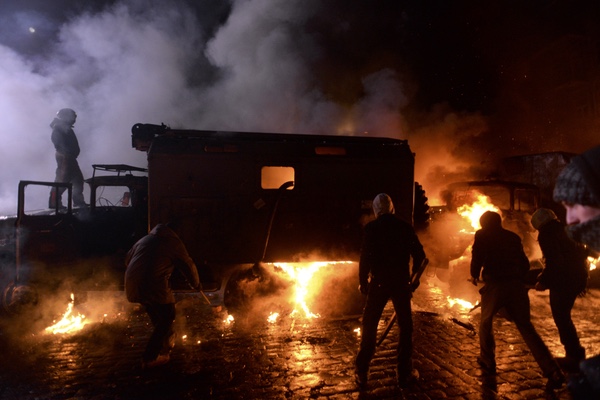Why a Long-lasting Peace in Ukraine Is Unlikely

Dynamivska str barricades on fire. Euromaidan Protests. Events of Jan 19, 2014-9 -- Wikipedia
All wars end eventually.
One side either imposes its will against the other or hostilities cease when both sides become mutually exhausted from fighting and also know that another day on the battlefield will not bring more success at the negotiating table. In brokered peace deals involving outside powers – such as the deal reached between Ukraine, Russia and pro-Russian rebels – there is a strong likelihood that foreign forces will have to forcibly monitor the peace or watch the cease-fire fail.
Ukraine has already experienced one failed cease-fire, and there is a high probability that the second Minsk agreement will fail as well. Neither warring faction has been able to impose its will on the other, nor do the sides appear to be tired from the toll warfare takes on human life. From the perspective of the Ukrainian government, the will to defend the political and territorial sovereignty of Ukraine is strong. Even political forces that are willing to accommodate some of Russia’s national security interests are unwilling to sacrifice too much sovereignty. You have to remember that Ukraine’s tragic history is one of Russian imperial control.
The separatists in the east do not appear to have lost the will to fight. Russia has enabled these separatists to make gains in recent weeks by providing sophisticated equipment, intelligence and soldiers. Russia’s media campaign also has shielded the separatists from complete delegitimization. More importantly, Western countries have been unwilling to provide more sophisticated weaponry to the Ukrainian government out of fear that Russia will respond in kind. Russia will likely match Western military aid, throwing Ukraine into deeper conflict and possibly destabilizing NATO itself.
For the ceasefire to work, outside powers will now have to own the peace by controlling their respective allies. France, Germany, and the United States should be able to exercise some control through financial mechanisms. The Ukrainian government is essentially bankrupt – and stabilizing the economy – not to mention defeating the separatists, cannot be done without funding from Western countries.
Does the current Ukrainian government have the will to control hardline nationalists in the government and on the battlefield? Will Western governments insist on changes? In parliament and government, the influence of these forces has never been greater, while the current pro-Western government has not exactly been a model of national unity. On the battlefield, right-wing militias have been sponsored by the Ukrainian government and its oligarchic supporters. These militias have not lost their will to fight.
The separatists in the east also appear to have the will to keep fighting, which will place additional pressure on Russian President Vladimir Putin to not accept compromises that amount to abandoning the separatists or Russia’s strategic interests. Putin’s rhetoric and actions have stoked nationalist sentiments in Russia. These sentiments may not only prevent him from compromising, but also may enable him to pursue a protracted conflict in the east that keeps Ukraine destabilized.
A weakened Ukraine is not an attractive option for membership in either the European Union or NATO. The goal of sustainable peace needs to address Putin’s limited political space to make compromises. Indeed, this problem is largely his own creation, but there is little that can be done about regime change in Russia. Thus, some level of autonomy for the Donbas region and language rights for the Russian speakers is needed, while Western donors can force the Ukrainian government to compromise.
The real sticking points are NATO membership and Crimea. Hardliners in Ukraine and Washington will not deny Kiev the right to apply for membership, while some Europeans may be willing to take NATO membership off the table. For their part, Russians cannot accept another NATO country on its border – and most especially not Ukraine. Putin and other hardliners will want an iron-clad deal. According to Moscow’s line, NATO violated previous promises on expansion and anything other than an official agreement will be a promise that the West can violate in the future.
The other issue is Crimea. The Ukrainian government may grudgingly accept Russia’s permanent basing of the Black Sea Fleet in Sevastopol. The real question then becomes: Will Putin accept anything but Moscow’s sovereignty over the whole peninsula? The return of Crimea has arguably healed the psychological wound of a lost empire. Maybe Putin is willing to accept a deal that gives Russia permanent control of Sevastopol, but that is a proposition Ukraine has always rejected.
In the absence of a grand bargain, however, the incentives for renewed conflict are great. Since the military forces in Ukraine are not mutually exhausted, and Kiev and Washington are unwilling to make a deal on NATO, the seeds of another failed cease-fire are already germinating.